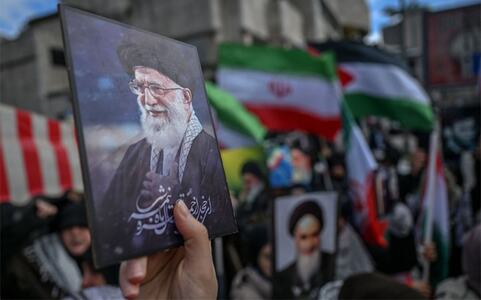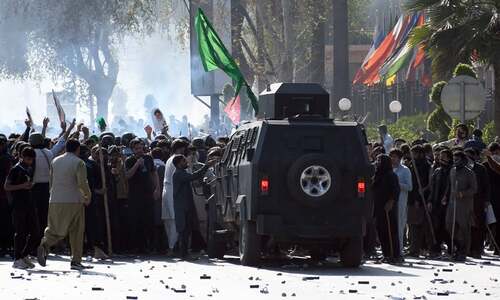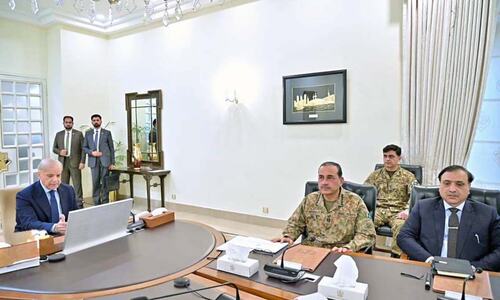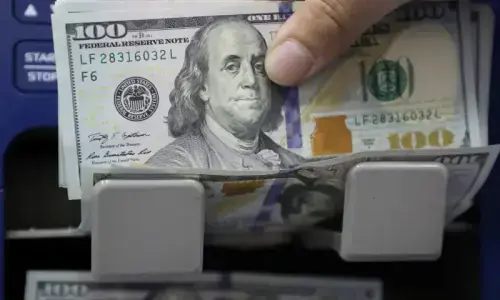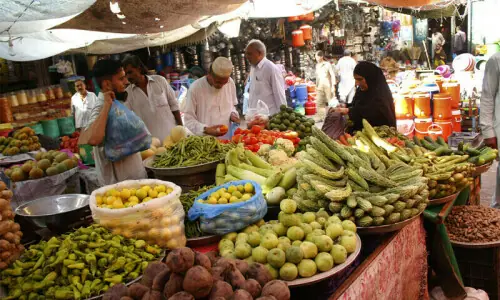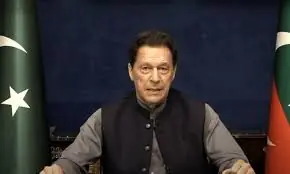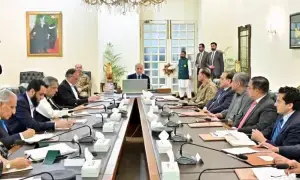ISLAMABAD, March 10: The Chief Justice of Pakistan, Justice Iftikhar Mohammad Chaudhry, was summoned by the president on Friday and asked to explain allegations of misconduct that are yet to be publicly specified.
The prime minister was also reported to be present. Both the president and the PM constitutionally do not have the power to do so, and who could know this better than the chief justice. This is one of the key differences between Pakistani and western societies.
The US president, the most powerful person in the world, invites the judges of the Supreme Court for tea, and they decline on the grounds that it would be improper for them to visit the White House. Our judges go and submit progress reports to the president, attend dinners and wedding parties thrown by the powers that be — and, in the same spirit, meet the president and the prime minister in the Army House when asked to do so.
What would have happened if Iftikhar Mohammad Chaudhry had refused to oblige on Friday?
Nothing, perhaps. In short, the president should not have ‘summoned’ the CJ to the Army House and the CJ, if so directed, should not have gone.
This is not the end of the story but only the beginning. After his meeting with the general, the CJ remained inside the presidential camp office for a few hours, and was later prevented from going to the Supreme Court by security officials. The police chased his car and blocked it near the Serena Hotel; he was later escorted to his official residence. Now no one can communicate with him. If he wasn’t detained, why would he wait at the camp office for several hours?
Who wields the power here? Definitely not the Chief Justice of the Supreme Court of Pakistan because a simple superintendent of police can prevent him from going to his office. This small gesture, if ignored, is enough to destroy the last vestiges of the institution of the judiciary in this country.
The whole episode has not only lowered the institution in the eyes of the general public and the other branches of the government, but has also created a terrible impression across the world about the status of the judiciary in Pakistan.
The Supreme Court, and the Supreme Judicial Council, should take notice of this indignity. This is regardless of how it handles the reference against the CJ. The two have become separate issues: no one in the country is challenging the authority of the president to refer a case of misconduct against a judge, although many wonder about the real reasons behind the move. However, there is hardly anybody in the country, except a few members of the federal cabinet, who are defending the suspension or ‘sacking’ of the CJ.
Article 209(7) of the Constitution says that a judge of the Supreme Court or of a High Court cannot be removed from office except as provided by this article. These two lines are simple and clear and one can easily come to the conclusion that the chief justice, in the context of the present imbroglio, can only be removed under Article 209 and in no other manner. There is no reason to even look at any other article of the Constitution; in the case of a conflict, 209(7) would become redundant and absurd.
Article 209 talks about a Supreme Judicial Council (SJC), consisting of the CJ, the two next senior-most judges of the Supreme Court, and the two most senior High Court chief justices.
The President of Pakistan has sent a reference against the CJ to this very Council.
The reference has apparently been filed under Article 209(5) of the Constitution which says that the president, if he comes to know about a judge’s alleged misconduct through information received from the SJC or from any other source, can ask the Council to “inquire into the matter” to determine whether the judge is guilty of the charge.
The judge whose conduct is under review obviously cannot continue sitting in the Council if he is a member, and is therefore replaced by the next senior-most member. Article 209(4) further says that if there is ultimately a difference of opinion amongst the members, the opinion of the majority shall prevail and the Council’s report to the president shall be expressed in terms of the view of the majority.
Article 209(6) says that after inquiring into the matter, the Council shall report to the president as to whether the judge has been found to be guilty of misconduct, and it shall be the Council that will advise the president as to whether the judge should be removed from office. If so advised, the president may remove the judge.
The constitutional provision on this subject cannot be clearer. Firstly, it says that a judge of the Supreme Court or a High Court cannot be removed, except through the Supreme Judicial Council. Secondly, the provision talks about the Council’s membership, and says that the judge whose conduct is being inquired into cannot continue to sit on the Council. Thirdly, it says that if the president comes to know through any source about misconduct involving a judge, he can refer the matter to the Council. Fourthly, it will be the Council that will find the judge guilty or not guilty, and it will only be the Council that will advise the president as to whether the judge should be removed or not.
The president has obviously been wrongly advised to take the unconstitutional step of ‘sacking’ or ‘suspending’ the chief justice. He has no authority under the Constitution to do this.
The next issue pertains to the alleged misconduct, a matter now pending before the Council. The allegations against the CJ have not been spelled out so far and he has virtually been condemned unheard, which is against a basic principle of natural justice. The allegations of misconduct began in part with Mr Naeem Bokhari’s open letter to the CJ. One wonders if Mr Bokhari really wrote this letter. Firstly, why would he write an open letter rather than a personal letter addressed to the CJ; secondly, whatever happened to the law of contempt vis-à-vis this letter; and thirdly, does Mr Bokhari believe that the CJ is the only soul in the whole judicial set-up of Pakistan who may be engaged in conduct unbecoming? There are some nearer home whom many talk about.
Regardless of the above concerns, Mr Bokhari did not specify any serious allegations. Of course, even a small deviation on the part of a senior judge is deplorable, but they all are miniscule when compared to the allegations against some of the other judges.
Mr Bokhari mentioned the CJ’s alleged insistence on protocol; his alleged desire to be presented a guard of honour in Peshawar; his alleged appropriation of a Mercedes-Benz car; the use of a Punjab government airplane and helicopter to offer Fateha in Multan and Sheikhupura respectively; and the use of a Sindh government plane to attend a High Court function. He also mentioned the CJ’s son, Dr Arsalaan, securing a position in the FIA when he did not secure sufficient marks, and was “perturbed” that the Supreme Court issued a clarification on the behalf of the CJ’s son.
He was “appalled” that the CJ announced decisions in court and apparently recorded conflicting conclusions in written judgments. He also accused the CJ of consistently violating the dignity of lawyers. Mr Bokhari did not like the way the CJ was conducting judicial proceedings; in fact, he felt that the CJ’s conduct constituted contempt of the Supreme Court itself. He was also “pained” by the wide publicity received by cases taken up by the CJ, calling it a “media circus”. He also claimed that the CJ was “prone to get angry in a flash”.
Many wonder how Mr Bokhari was able to get all this information, and in such detail. It would be even more intriguing if any of it is correct as that would prove that he has access to an authentic source of information which even the Council may be interested in identifying.
Mr Bokhari found the CJ’s Court Number One to be a “media circus”, particularly when he dealt with human rights cases. How does one describe the current media trial of the Chief Justice of the Supreme Court of Pakistan, who has been condemned unheard and cannot even move about freely?
The writer is an advocate of the Supreme Court of Pakistan.

